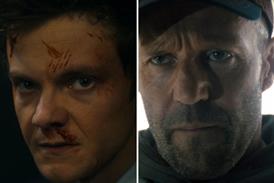Dir:Chen Yifei. China. 2006. 104mins.
Lushly photographedhistorical romances from mainland China are not exactly in short supply intoday's film market, but The Music Box
Not surprisingly, image was everythingfor The Music Box's director, Chen Yifei, one of China's most popular modern painters. His picturesquecanvases of languorously posed Chinese women are among some of the mostomnipresent commercial art images in the country, although he also parlayed hisfame into careers as fashion consultant, publisher, modeling agent, andlifestyle entrepreneur).
TheMusic Box reflects his obsessions - but also sadlymarks the end of his life. During a troubled shoot (the original star Jiang Wen withdrew after filmingbegan; production was then suspended for two years) Chen passed away, aged 59.Shooting and post-production were subsequently supervised by Hong Kong producerand director Ng See-yuen (credited as 'artexecutive').
Chinese box office has yielded asurprisingly high RMB 8m during the film's two-month run, which suggests that ChenYifei's posthumous fame was an effective sellingpoint. The version screened at the Shanghai International Film Festival includeda visual eulogy to Chen, with behind-the-scenes following the end credits.Western film festivals after grandly executed period exoticism withoutmartial-arts flash may find The Music Boxcongenial, though its television soap-style narrative won't help to win overdemanding audiences.
Opening during the Japanese invasion of Shanghai in 1937, the story instantlyplunges popular Shanghai-based hairstylist Lu Ping (Chen Kun) into the action.When his client, singer Yu Mian (Wang Yajie), bashes the head of a Japanese soldier who isattempting to rape her in Lu's salon, the startled baber accidentally slits the throat of the soldier'scompanion he is shaving at the time.
On the run, Lu takes refuge in alovely canal-lined village where Song (Ren Guangzhi), his master's brother lives. Song's beautifuldaughter Jiayi (Zeng Li) isjust celebrating her engagement of convenience to a high ranking Kuomintang(KMT) military commander (Liu Guanjun), but thisdoesn't stop her from fixing her amorous attention on a curiously hesitant Lu.
The fugitive stumbles across Communistrebels, whose hair he cuts, and who hail him as a hero for killing the Japanesesoldier. He is bombed by, then captured by, Japanesetroops. When their commander demands a shave, Lu refuses, instead cutting hisown hand, in his only real act of (albeit passive) resistance. Furtheradventures take him back to Shanghai after the Japanese defeat, where he isincongruously promoted to a series of ever higher KMT commissions before he iscaptured by the victorious Communists in 1949.
Aside from a schematically structuredplot that lumbers through each incident via well-trodden cliches, the film'smajor liabilities are its main stars. Chen Kun as Lu Ping has a wooden, allpurpose doe-eyed stare that probably plays to his teen-idol fan base, butnothing more. As the beauty Jiayi, newcomer Zeng Li lacks screen presence and the visual charismaneeded to support all the loving close-ups that the film offers her.
Lively performances by secondarycharacters (Wang Yajie's sexy singer, Liu Guanjun's creepily passive KMT officer) tend to overshadowthe principals. Xi Qiming's cloyingly overbearingmusical score (a common liability of mainstream Chinese productions) does thefilm no favours.
The Music Box upholdsChen Yifei's reputation for softly focused,exquisitely lit period nostalgia, much as his first film Evening Liaisons did (in CannesUn Certain Regard in 1995). Wang Xiaoming'sluminous widescreen photography frequently outshines the film's stodgy material.
The curiously empty formalism of theoverly melodramatic plot and Lu Ping's odd lack ofpassionate interest in any of the females around him (and the uncanny intensityof his scenes with the soldiers whose heads he shaves) hints that there mightbe rather interesting, unarticulated undercurrents lurking beneath the film'sgrandiose surface. But the film refuses to commit itself in any direction,falling in a nether region somewhere between the poles of enjoyable light camp,luscious romance, and serious history.
Production companies
Shanghai Chen Yifei Construction Environment Art
Beijing China Film Yuanshen Production
International sales
China Film Group Corp
Executive producers
Yang Buting
Chen Yifei
Producers
Han Sanping
Song Meiying
Screenplay
Fan Yiping
Chen Yifei
based on the novel by Fan Yiping
Cinematography
Wang Xiaoming
Editor
Pan Xiong
Production design
Wang Xingchang
Zhang Hui
Music
Xi Qiming
Main cast
Chen Kun
Zeng Li
Liu Guanjun
Wang Yajie
Ren Guangzhi
Bi Yuanjin
Li Lihong
Wei Zongwan



















No comments yet